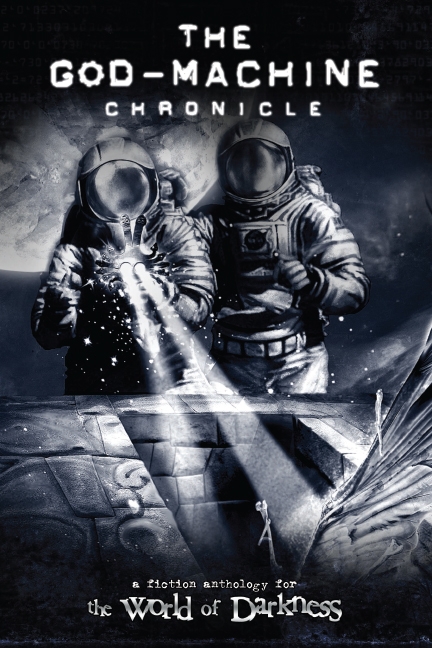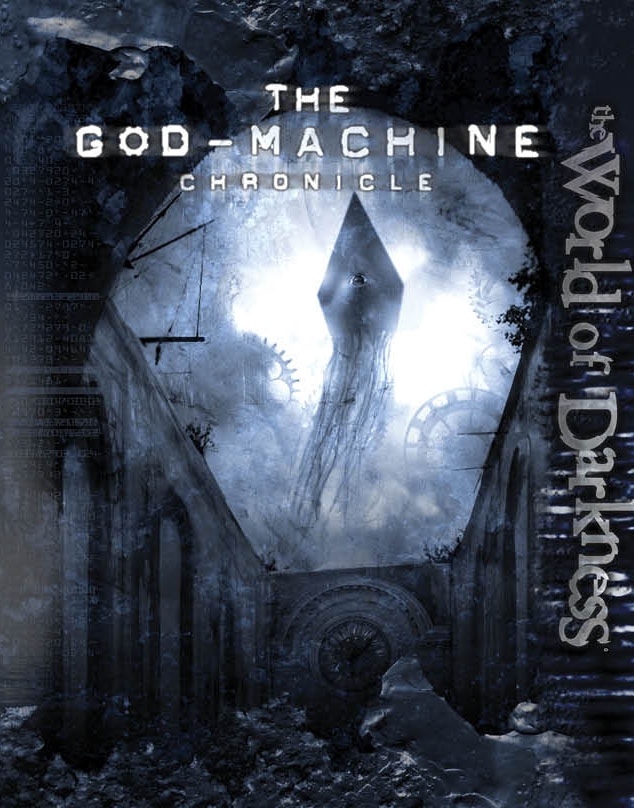Beneath the skin of the world you know, a terrible machine grinds and gnashes its gears. Its cogs range in size from the flap of a butterfly’s wings to the meteor that killed the dinosaurs. The God-Machine’s tools are timeclocks and angels, crushing banality and outrageous supernatural intervention; these contradictions are unified in the alien-clockwork of its inevitability. Azathoth is not a screaming, pulsating tumor of chaos at the center of reality; it is rust and cold and wire, soldered together. The factory assembly line for the banality of evil. Darkseid’s Anti-Life Equation, made from iron and clockwork and tesla coils. This is the premise behind The God-Machine Chronicle, the newest major World of Darkness offering (and its attendent short fiction anthology). Based on the piece of flavor text that began the core World of Darkness book, The God Machine Chronicle also introduces a number of major rules updates.
Didn’t I say before that the World of Darkness was at its best when it abandoned canon? Well, with the first round of offerings from their new print-on-demand distributor, Oynx Path, it seems like they agree. Glad tidings indeed! They’re creating a series of Chronicles; optional and modular offerings that are half-way between each point of a triangle: part adventure, part campaign setting and a part re-imagining. The lessons of Mirrors has been taken to heart, it seems, and the open-ended nature of the “new” World of Darkness is finally being taken advantage of on a large scale…frankly, I couldn’t be happier.
Let’s talk a little bit about the new rules. First off, Morality gets overhauled into Integrity, which is probably the most visible change. Personally, this is sort of how I’ve always used Humanity, rolling an “alignment” mechanic into a “sanity” mechanic. Conceptually, I’m fine with it but…really? Composure plus Resolve? Don’t we have enough core mechanics—notably, Willpower—that rely on those two attributes? I have to admit, it made me wistful for the days of Vampire: the Masquerade’s moral attributes, like Courage and Conscience. The new combat mechanics…well, they exist. I personally admired the extreme elegance of having weapons just straight add dice to the roll, cutting out a special “damage” mechanic, and I think tying Defense to Athletics sort of demands that players pay attention to it, over-weighting it, but neither of these are major concerns.
Complaints aside, a lot of the new mechanics in God-Machine resemble a lot of the house rules I’ve adopted in my campaign (which I run with the World of Darkness system), seeming to come from the same impulse and at a similar angle. I’ve long admired the way that Vice and Virtue reward players for making choices that are in-character for their PCs but are also obviously sub-optimal for “winning” the game. We’ve all had those moments, where you as the player can see a bad thing coming from a mile away, because you’ve familiar with the tropes of the genre, and the World of Darkness is good at rewarding you for falling for it despite any meta-game knowledge. Sure, pry the rubies out of the demonic idol, go right ahead!
Personally, however, I think the bean-counting gets a little too out of hand. I like the use of Conditions, which are essentially short-term and long-term Flaws, which impair you and reward you for applying their negative consequences in game, but I don’t like counting “Beats” to collect Experience points. In my game, I use the same mechanic to replenish Willpower—for non-rule based mishaps as well, like if a player decides on a colossal strike with their sword to arbitrarily have it wrench out of their hand, disarming them, I grant it too—instead of Experience points, just because I don’t want “grinding” for experience to be a thing, let alone a disruptive one. Besides that, I just generally would rather have people paying attention to the game, rather than their character sheet. I may play a little more fast and loose, but I still very much agree with the idea behind Conditions and Tilts.
One thing that makes God-Machine and the idea of a Chronicle book really appeal to me is just how modular it is! The core of the book is a serious of vignettes, of adventures, but they aren’t meant to be used linearly. Heck, they aren’t even your usual flow chart format; instead, The God-Machine Chronicle tries to give you the tools to make your own flowchart; it encourages you to use the prepared materials in any way you see fit; to tweak and discard, to cobble together and invert, if that is what you want. Just reading along I came up with the idea that The God-Machine’s true purpose—left purposefully undecided in the book—is to regulate the living from the dead…and now the underworld is full. “Operation: Bell Jar’s” creepy oil rig is a test site for the God-Machine’s experiments to integrate souls and machines, leading to “Ghost Machine’s” haunted electronics, “Missing Person” is an attempt to fix the same problem through dimensional abductions. When that fails, “Wake the Dead’s” magical realistic zombie story is inevitable as is the “Scarlet Plague,” as the God-Machine tries to force-quit the program with sterilization and extinction. There are plenty of other options—including a great time-travel campaign I whipped up that would make Steven Moffat weep, all about Dark Matter and the Big Crunch—and the moving pieces (and movable pieces) are so evocative it is hard not to dream one up just flipping through.
opens in a new window The related collection of fiction is worth checking out as well; Mark L. S. Stone’s “Ouroboros” directly inspired a threat in the current campaign I run, and I think that is an achievement in itself. It also includes the aforementioned story that started it all, McFarland and Chillot’s “Voice of the Angel.” If you don’t own the World of Darkness core book, but have somehow read this far, that story alone is worth checking out the anthology for. A perfect piece of paranoid outsider art, it just oozes a disturbing verisimilitude. McFarland’s “Stories Uncle Don Told Me” and “Go Back” by Stew Wilson both also stand out for me as creepy and inspiring; The God-Machine Chronicle is really McFarland’s baby and you can tell it looms large in his head.
The related collection of fiction is worth checking out as well; Mark L. S. Stone’s “Ouroboros” directly inspired a threat in the current campaign I run, and I think that is an achievement in itself. It also includes the aforementioned story that started it all, McFarland and Chillot’s “Voice of the Angel.” If you don’t own the World of Darkness core book, but have somehow read this far, that story alone is worth checking out the anthology for. A perfect piece of paranoid outsider art, it just oozes a disturbing verisimilitude. McFarland’s “Stories Uncle Don Told Me” and “Go Back” by Stew Wilson both also stand out for me as creepy and inspiring; The God-Machine Chronicle is really McFarland’s baby and you can tell it looms large in his head.
Mordicai Knode is a big Promethean fan—Frankenstein’s Monster and alchemy, what’s not to like?—so he’s very interested in the relationship of the Principal and the quashmallim to the God-Machine and it’s angels, so he wants to see more of Mary Dear and the third policeman. You can catch up with him on Twitter and Tumblr.










